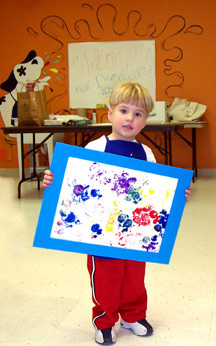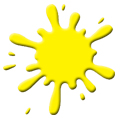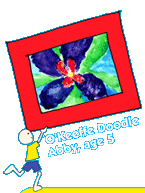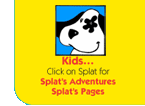
 FAQ's FAQ's
 What is Abrakadoodle? What is Abrakadoodle?
Abrakadoodle is the nation's leader in creative art education,
offering imaginative classes in painting, sculpting, digital
design, collage, mosaics, drawing, and more for children 20 months to twelve years old.
 Why was Abrakadoodle created? Why was Abrakadoodle created?
America is ready for a renaissance in arts education! Even
as art programs have crumbled amidst budget cut backs, Abrakadoodle
has emerged as an innovator built upon a love for education
and a passion for art. With its belief that more is better,
Abrakadoodle inspires students with its wide range of engaging
art activities packed with educationally rich content.
 Why choose Abrakadoodle? Why choose Abrakadoodle?
Abrakadoodle is simply the finest, most comprehensive art
program of its kind. Well-trained instructors, outstanding
art materials and tools, as well as exceptional curriculum
inspire students.
 Where are classes offered? Where are classes offered?
Abrakadoodle brings classes, curriculum, materials and
teachers to schools (both private and public), parks and
recreation departments, community centers, day care centers,
preschools and other convenient locations.
 Are Abrakadoodle classes educational? Are Abrakadoodle classes educational?
Abrakadoodle's exclusive curriculum is designed by artists
and educators. The integrated curriculum exceeds National Standards for Visual Arts
Education. In Abrakadoodle programs, children learn about artists, techniques, artistic style, use of media as well as art history, international styles and cultural background. In the early childhood program, children develop fine motor skills, language, cognitive and school readiness skills.
 What is active discovery creation? What is active discovery creation?
Abrakadoodle art education is based on the learning principles
of celebrated Swiss educational theorist Jean Piaget. He
believed that children learn through active exploration.
In Abrakadoodle classes, our teachers present an enchanting
environment in which children are introduced to a variety
of materials, methods and ideas that encourage individual
expression.
 What is Process Art? What is Process Art?
Abrakadoodle's style of art instruction is called Process Art. Process Art focuses upon what the children are learning through the "process" of creating their art. It allows children to experiment and be creative. It also allows children to make mistakes and learn from their mistakes.
 What is Product Art? What is Product Art?
Children often create Product Art in school. Product Art focuses on the end result. Children are instructed to "copy" an adult model. In the end, all the children have artwork that resembles the teacher's artwork. Examples of Product Art are the turkeys children create using a paper plate and construction paper or the bubble gum machine that was created by following group step-by-step instructions.
 Why is Process Art so important? Why is Process Art so important?
Process Art allows children to try new techniques, experiment with ideas and use their imaginations. There are no right or wrong answers. Almost everything children do in education has an expected outcome. We believe that art should be a personal expression resulting in a unique piece of artwork not a copy of someone else's work. To learn more about Process Art , click here.
 What is Doodle Drawing? What is Doodle Drawing?
Doodle Drawing is Abrakadoodle's revolutionary drawing program for children ages three to twelve. It combines three important elements: artistic technique, individual creativity and developmentally appropriate practice. It has received rave reviews form educators, parents and young artists.
 Why begin art instruction so early? Why begin art instruction so early?
 Experts agree that the arts
are a natural means for young children to play and learn.
The benefits of early arts education are many: motivates
children in learning, stimulates memory, facilitates understanding,
enhances symbolic communication, strengthens problem-solving,
develops imagination and critical thinking, builds self confidence
and a sense of craftsmanship. The arts play a central role
in cognitive, motor, language, and social-emotional development.
Young children are very receptive to the arts! Experts agree that the arts
are a natural means for young children to play and learn.
The benefits of early arts education are many: motivates
children in learning, stimulates memory, facilitates understanding,
enhances symbolic communication, strengthens problem-solving,
develops imagination and critical thinking, builds self confidence
and a sense of craftsmanship. The arts play a central role
in cognitive, motor, language, and social-emotional development.
Young children are very receptive to the arts!
 How does Abrakadoodle complement school programs? How does Abrakadoodle complement school programs?
Abrakadoodle makes it easy for schools
to offer the best in art education. We integrate Abrakadoodle
into your school curriculum by providing hands-on lessons in
a variety of art forms and styles, along with specialized
techniques and incorporating art history. Abrakadoodle also
offers popular, enriching after-school programs, as well
as specialty classes and camps. Abrakadoodle's lesson plans
are carefully crafted, its teachers are very well trained,
and it uses high quality art materials through a partnership
with Crayola. Abrakadoodle is professional and polished in
every respect!

 What types of art mediums do children
experience? What types of art mediums do children
experience?
Abrakadoodle immerses students in many different types
of art mediums. From working with acrylics and tempera paints
to stamp art, drawing and digital design, as well as sculpting
and designing mosaics, Abrakadoodle features the broadest
landscape of art classes to kindle your imagination.
 What is Abrakadoodle's Artists of Distinction program? What is Abrakadoodle's Artists of Distinction program?
Abrakadoodle features great contemporary artists as Artists
of Distinction. These artists teach us about their
styles, inspire us with their creative vision and serve as
our Contemporary Art experts. We are currently proud to work
with Mort Solberg, Award-Winning Painter; Korky
Paul, British Children's Book Illustrator; Lisa
Cherkasky, Food Designer and Author; Myrna
Hoffman, Award-Winning Educational Toy Designer,
as well as several other contemporary artists.
 Which other artists are featured in Abrakadoodle programs? Which other artists are featured in Abrakadoodle programs?
In addition to our Artists of Distinction, Abrakadoodle
introduces children to the styles, techniques and history
of such renowned artists as Cezanne, Picasso, Renoir, Jackson
Pollock, Monet, Estivalet, Laurel Burch, Chagall, Ansel Adams,
Rousseau, Klee, O'Keeffe, Modigliani, Seurat, Eric Carle,
Hokusai and Andy Warhol, to name several.
 Is Abrakadoodle's curriculum multicultural? Is Abrakadoodle's curriculum multicultural?
Abrakadoodle's entertaining multicultural
art lessons engage the senses while engendering an appreciation
for different cultures. Students learn the art of making
Japanese fans with Sumi e while listening to Japanese music.
Children create Chinese Bamboo Chalk Pastels and Mexican
Sun Faces. They visit Ancient America while making Mimbres
Bowls of the Anasazi and travel back to Ancient Greece to
sculpt Grecian Urns. From Australia, children participate
in Aboriginal Dot Painting, and they produce Rainforest Bird
Collages from Ecuador. Students delight in designing Inuit
Bear Sculptures from the Arctic Circle, and they make Magic
Wands as part of their adventures at the Hogwarts Academy.
With ongoing program development, the multicultural opportunities
are endless.
 How can I help bring Abrakadoodle to my child's school? How can I help bring Abrakadoodle to my child's school?
Locate the Abrakadoodle Director that serves your community
by clicking on our location finder. Let the Director
know that you want Abrakadoodle to work its magic in your
school. You may also contact Abrakadoodle Educational Services
at info@abrakadoodle.com.
 Did you know? Did you know?
- Abrakadoodle is a proud partner
of Crayola ®; ensuring that
top quality art materials support its cutting edge
curriculum.
- Abrakadoodle's Artists of Distinction
program adds color and value; noted contemporary
artists share their unique style, methods and vision,
which is integrated into Abrakadoodle's uniquely
fabulous lesson plans.
- Comprehensive arts education
is proven to help students perform better academically.
- Art helps children develop such literacy
skills as reading, writing, speaking, listening, focusing
and problem solving.
- Kids learn to be more tolerant and
open through their involvement in the arts.
- The arts promote individuality,
bolster self-confidence, and improve overall academic
performance.
- The arts can help at-risk youth develop
a better attitude towards school.
-
An impressive 89% of
Americans believe that arts education is an important part of a well-rounded education.

|



